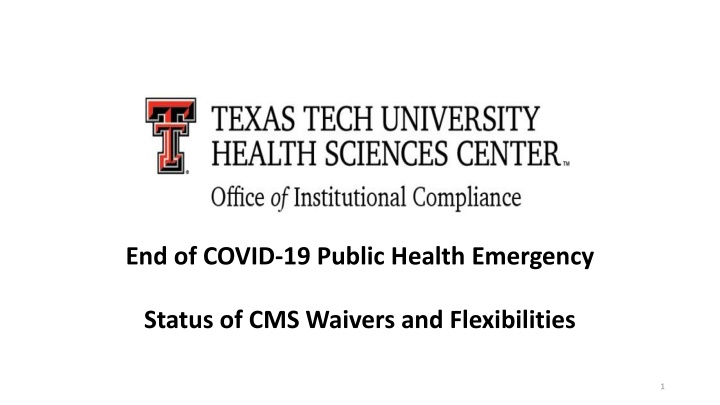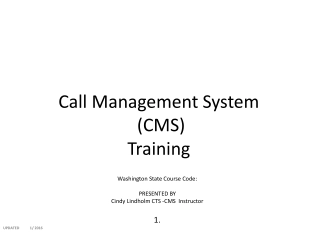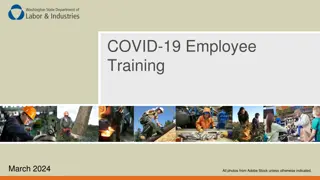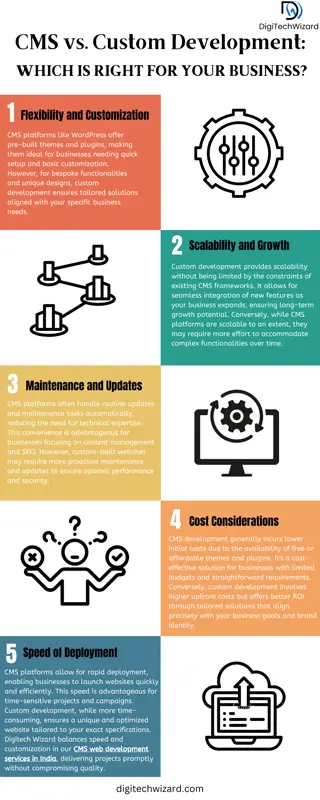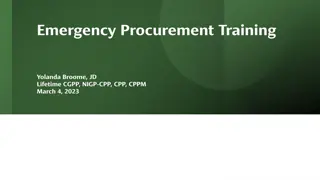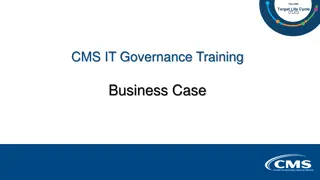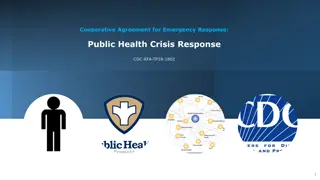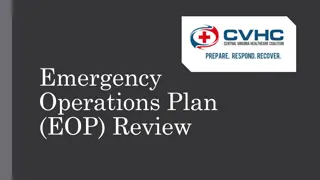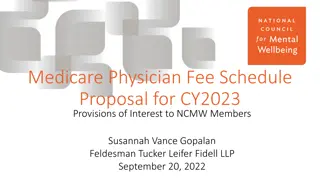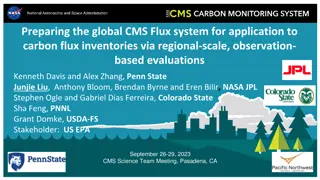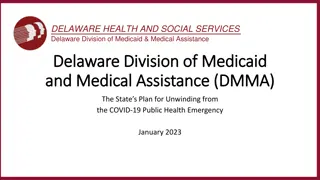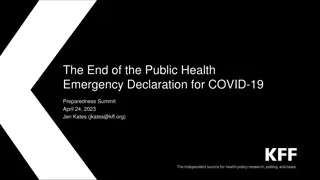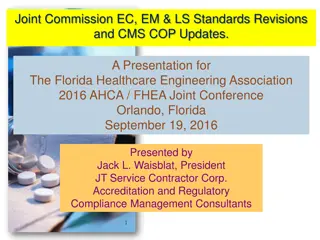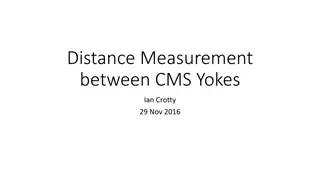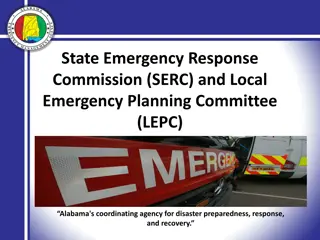Changes in CMS Flexibilities Post COVID-19 Public Health Emergency
The COVID-19 Public Health Emergency (PHE) ended on May 11, 2023, leading to revisions in CMS waivers and flexibilities. Virtual supervision of residents in rural areas is now allowed, with specific requirements for teaching physicians. Resident supervision standards have reverted to pre-PHE norms, emphasizing personal documentation by teaching physicians. The Primary Care Exception Rule and provisions for virtual direct supervision have also been adjusted post-PHE.
Download Presentation

Please find below an Image/Link to download the presentation.
The content on the website is provided AS IS for your information and personal use only. It may not be sold, licensed, or shared on other websites without obtaining consent from the author.If you encounter any issues during the download, it is possible that the publisher has removed the file from their server.
You are allowed to download the files provided on this website for personal or commercial use, subject to the condition that they are used lawfully. All files are the property of their respective owners.
The content on the website is provided AS IS for your information and personal use only. It may not be sold, licensed, or shared on other websites without obtaining consent from the author.
E N D
Presentation Transcript
End of COVID-19 Public Health Emergency Status of CMS Waivers and Flexibilities 1
COVID-19 public health emergency was declared January 2020 and extended multiple times. PHE allowed waivers and flexibilities of rules/policies to enable access to care. COVID-19 Public Health Emergency (PHE) Ended May 11, 2023 2
Resident Supervision After May 11, 2023, virtual supervision* of residents is only be allowed in rural areas (defined as non-metropolitan statistical areas (MSAs)^. Only teaching physicians in residency training sites located outside of a MSA may meet the presence of the key portion requirement through audio/visual real-time communications technology. *physician supervision provided virtually using real-time audio/video technology ^MSA is a geographic entity based on a county or a group of counties with at least one urbanized area with a population of at least 50,000 and adjacent counties with economic ties to the central area, e.g., Lubbock, Amarillo, Midland, Odessa, Abilene. https://www.cms.gov/files/document/teaching-hospitals-physicians-medical-residents-cms-flexibilities-fight-covid-19.pdf 3
Resident Supervision (cont.) This means TTUHSC will revert to pre-PHE standards for resident supervision, i.e., teaching physician (TP) billing E/M services must personally document: The TP did the service or was physically present during critical or key resident-provided service and procedure portions. If the TP sees the patient separate from the resident, the TP must document that they saw and evaluated the patient, in addition to reviewing the resident s note and either agreement with the note/findings, or add additional information; The TP participated in patient management. 4
Primary Care Exception (PCE) The Primary Care Exception Rule will revert to pre-PHE guidance: HSC Primary Care Clinics are Family Medicine, General Internal Medicine, Pediatrics and Ob/Gyn. After May 11th, teaching physicians can bill for levels 4-5 of an office/outpatient evaluation and management (E/M) visit furnished by residents in a primary care center only when the teaching physician is physically present for the key portion of the service. The primary care exception includes level 1-3 E/M services, annual visits, interprofessional internet consults and virtual check-in s. https://www.cms.gov/files/document/teaching-hospitals-physicians-medical-residents-cms-flexibilities-fight-covid- 19.pdf https://www.govinfo.gov/content/pkg/FR-2021-11-19/pdf/2021-23972.pdf https://www.govinfo.gov/content/pkg/FR-2021-11-19/pdf/2021-23972.pdf 5
Virtual Direct Supervision Until December 31, 2023, direct supervision may be provided using real time, interactive audio/video technology (excluding audio-only) instead of requiring their physical presence. CMS also clarified to allow immediate availability for direct supervision via virtual presence (interactive audio/video technology). Purpose is to facilitate provision of telehealth services by clinical staff incident to the services by physicians and other practitioners. https://www.cms.gov/files/document/what-do-i-need-know-cms-waivers-flexibilities-and-transition-forward-covid-19- public-health.pdf https://www.govinfo.gov/content/pkg/FR-2021-11-19/pdf/2021-23972.pdf 6
Residents Providing Telehealth Visits After May 11, 2023, residents are only be allowed to provide telehealth visits under virtual supervision in rural areas (defined as non- metropolitan statistical areas (MSAs). https://www.govinfo.gov/content/pkg/FR-2021-11-19/pdf/2021-23972.pdf https://www.govinfo.gov/content/pkg/FR-2020-12-28/pdf/2020-26815.pdf 7
Cost Sharing Obligations (coinsurance and deductibles) During the PHE, OIG did not enforce cost sharing requirements for telehealth services provided to Medicare beneficiaries, i.e., institutions had the option of waiving coinsurance and deductible payments by Medicare beneficiaries. After May 11, 2023, cost sharing requirements (e.g., coinsurance and deductible are enforced. 8
Remote Patient Monitoring (RPM) After the PHE ended on May 11, 2023, CMS requires that RPM services are furnished only to established patients and the remote monitoring must be for 16 or more days of data in a 30-day period for billing. https://www.cms.gov/files/document/physicians-and-other-clinicians-cms-flexibilities-fight-covid-19.pdf 9
Virtual Check-Ins Virtual check-ins are brief communications with providers via various technologies, including telephone, secure text messages, email, patient portal, audio-visual (Zoom). After the PHE ended on May 11, 2023, virtual check-in codes are allowed for established patients only. 10
E-Visits An e-visit is a non-face-to-face communication between a patient and their provider through an online patient portal. In additional to physicians and other non-physician providers, PTs, OTs, and speech language pathologists can provide e-visits. This policy was made permanent in the 2021 Physician Fee Schedule final rule. 11
CR Modifier and DR Condition Code After PHE Ends After May 11, 2023, neither the CR modifier or DR condition should be reported: CR: disaster-related (indicates services were rendered to victim of a declared disaster). DR: disaster-related claim covered by blanket waivers 12
Inpatient Rehabilitation Facility (IRF) After May 11, 2023, rehab physicians are required to visit IRF patients face- to-face at least three times per week, and are no longer allowed to be performed as telehealth. In-person, weekly interdisciplinary team meetings are expected. Rehab physicians may lead remotely using video, telephone conferencing, or other technology. https://www.cms.gov/files/document/inpatient-rehabilitation-facilities-cms-flexibilities-fight-covid-19.pdf 13
HIPAA Compliance Beginning August 10, 2023, telehealth platforms must be HIPAA compliant. Until that date OCR will continue to exercise its enforcement discretion and will not impose penalties on covered health care providers that make good faith provisions of telehealth. 14
Who Can Provide Telehealth Services? Permanent: Physicians, nurse practitioners, physician s assistants, nurse midwives, certified nurse anesthetists, clinical psychologists, social workers, registered dieticians, and nutrition professionals May Provide Telehealth Services Until December 31, 2024: Physical therapists, occupational therapists, audiologists, and speech language pathologists 15
Reporting Address of the Location of Provider Beginning January 1, 2024, Practitioners who render telehealth services from their home will be required to report their home address on the Medicare enrollment. https://www.cms.gov/files/document/teaching-hospitals-physicians-medical-residents-cms-flexibilities-fight-covid-19.pdf 16
Telehealth Services - Medicare Through December 31, 2024, people with Medicare can access telehealth services in any geographic area in the United States, i.e., does not have to be in a rural area/non-MSA, including in their homes. https://www.cms.gov/files/document/mm12982-medicare-physician-fee-schedule-final-rule-summary-cy-2023.pdf 17
Patient Location for Telehealth Services Beginning January 1, 2025, telehealth will only be covered in rural areas (non-metropolitan statistical areas^) and the patient may not be in his/hers home, i.e., must be at an originating site (hospital, clinic, physician office, etc.) ^MSA is a geographic entity based on a county or a group of counties with at least one urbanized area with a population of at least 50,000 and adjacent counties with economic ties to the central area, e.g., Lubbock, Amarillo, Midland, Odessa. https://www.appropriations.senate.gov/imo/media/doc/JRQ121922.PDF 18
Patient Location for Telehealth Services - Mental Health Services and Substance Use Disorder Treatment for substance use disorder and mental health services can be provided in any geographic region and in the patient s home permanently. 19
Place of Service - Telemedicine Until December 31, 2023, use the place of service (POS) that would have been used if the patient was seen in person, and use modifier 95 (synchronous telemedicine service rendered via real-time interactive audio and video telecommunications system, e.g., zoom) Starting January 1, 2024, use POS 2 (telehealth provided other than in the patient s home) or POS 10 (telehealth provided in the patient s home). https://www.cms.gov/files/document/mm12982-medicare-physician-fee-schedule-final-rule-summary-cy-2023.pdf 20
In-Person Visit Requirement for Mental Health Services Through December 31, 2024, many behavioral health and education services can be furnished using audio-only technology. Beginning January 1, 2025, for mental health services, the patient must be seen in person within 6 months prior to telehealth visit. The in- person visit can be provided by physicians in the same specialty and group practice. A subsequent in-person visit each 12 months is required for mental health services, however, exceptions to the subsequent visit requirements are allowed. 21
Controlled Substance Prescribing Telemedicine flexibilities for prescribing controlled medications were extended to November 11, 2023. After November 11th, an in-person visit will be required in order to prescribe controlled substances. The Ryan Haight Act does not limit a practitioner's ability to prescribe controlled medications for a patient after there has been at least one in- person medical evaluation. DEA, SAMHSA Extend COVID-19 Telemedicine Flexibilities for Prescribing Controlled Medications for Six Months While Considering Comments from the Public 22
Telephone E/M Visits Through December 31, 2024, Medicare payment for telephone E/M visits (CPT codes 99441-99443) is equivalent to an established office/outpatient visit. https://www.cms.gov/files/document/mm12982-medicare-physician-fee-schedule-final-rule-summary-cy-2023.pdf 23
93 Telephone E/M and Audio-Only Beginning January 1, 2025, CMS will not cover audio-only services (telephone E/M) except for mental health services. Medicare is requiring use of modifier 93 for audio-only services. FQHCs and RHCs should use modifier 93, replacing modifier FQ. https://www.cms.gov/files/document/physicians-and-other-clinicians-cms-flexibilities-fight-covid-19.pdf 24
Out-of-State Patients After the PHE ends on May 11, 2023and permanently thereafter, the states will determine whether or not a provider is allowed to provide services in the state. The state laws that apply are based on where the patient is located. 25
Licensure New Mexico The NM medical board shall issue a licenses physician a telemedicine license to allow the practice of medicine across state lines. Kansas Notwithstanding any other provision of law, a physician holding a license issued by the applicable licensing agency of another state or who otherwise meets the requirements of this section may practice telemedicine to treat patients located in the state of Kansas, if such physician receives a telemedicine waiver issued by the state board of healing arts Oklahoma Physician treating patients in OK through telemedicine must be fully licensed in OK. For more information on specific states licensure requirements, refer to the Federation of State Medical Boards (last update: March 13, 2023). 26
State Governance Treating New Mexico patients malpractice case brought in NM. The New Mexico Supreme Court ruled that New Mexico courts will follow Texas sovereign immunity laws, that statute was no longer needed. New Mexico residents should continue to sign the TTUHSC Health Care Provider-Patient Contract-Governing Law and Venue form so that they are aware of the fact that lawsuits regarding care will be required to be filed in Texas. 27
References: AAMC: COVID-19 PHE Waivers and Flexibilities: Status Update April 11, 2023 AAMC: End of the COVID-19 PHE April 28, 2023 Center for Connected Health Policy: Medicare Telehealth / Connected health Waivers Post-PHE March 2, 2023 CodingIntel: Coding for Telehealth May 1, 2023 Consolidated Appropriations Act, 2023 CMS: Physicians and Other Clinicians: CMS Flexibilities to Fight COVID-19 February 24, 2023 Novitas Solutions: The End of the COVID-19 Public Health Emergency (PHE): What you need to know May 10, 2023 28
This presentation and other resource information on the end of the COVID- 19 Public Health Emergency (PHE) are available on TTUHSC Institutional Compliance webpage: Compliance COVID-19 Updates; End of the PHE Questions can be directed to your campus Compliance Office or John Geist, Managing Director Billing Compliance: john.geist@ttuhsc.edu 29
